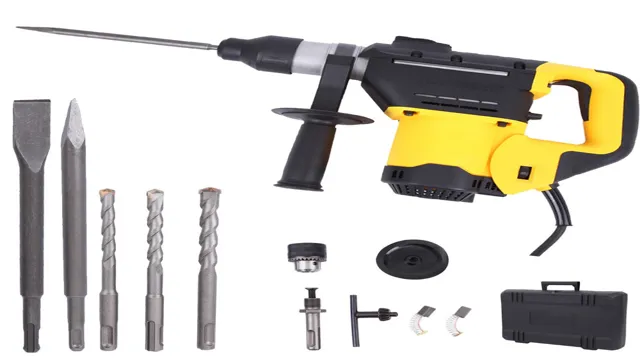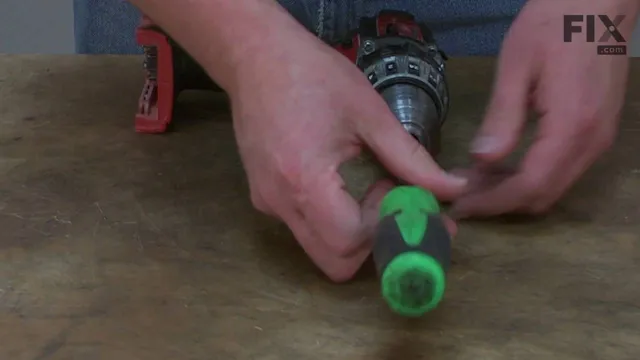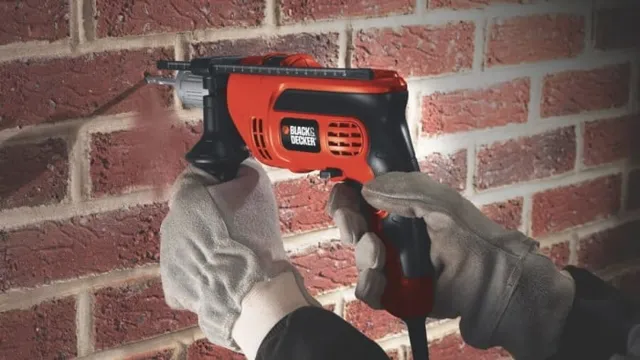Do You Have to Use a Hammer Drill for Concrete? Learn the Right Tool for the Job
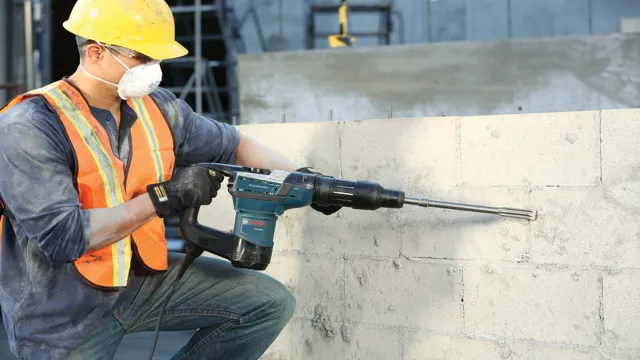
Hammer drills are often seen as a necessary tool when it comes to drilling into concrete. But does that mean you absolutely have to use one for all your concrete drilling needs? The answer is not that simple and depends on a few factors. In this blog post, we’ll go over everything you need to know about using a hammer drill for concrete and whether it’s necessary or optional.
So put on your DIY hat and let’s dive in!
The Basics of Drill Bits
When it comes to drilling into concrete, using a hammer drill is recommended for the best results. The reason for this is because concrete is a very hard and dense material, making it difficult for regular drill bits to penetrate. A hammer drill uses a pulsating motion to break through the tough surface of concrete, making it much easier to drill holes.
While it is technically possible to use a regular drill bit on concrete, it will take much longer and might not produce the desired results. Also, using a hammer drill can help prevent the drill from overheating or becoming damaged due to excessive force. So if you want to get the job done efficiently and effectively, it’s best to use a hammer drill for drilling into concrete.
Types of Masonry Bits
When it comes to masonry work, having the right drill bits is crucial. There are various types of masonry bits that you can choose from depending on the project you’re working on, including the twist, sds-plus, and sds-max bits. Twist bits are the most common types of bits and are suitable for drilling small holes in soft materials.
SDS-plus bits, on the other hand, have a more aggressive design that allows for faster drilling in harder materials like concrete and brick. Finally, SDS-max bits are the largest and most powerful masonry bits, designed for drilling in the toughest materials. Whether you’re a professional contractor or a DIY enthusiast, choosing the right type of masonry bit can make your drilling experience much smoother and more efficient.
So next time you’re heading out to buy drill bits, consider the type of material you’ll be drilling through and choose accordingly. With the right bit, you can tackle any masonry project with ease and confidence.
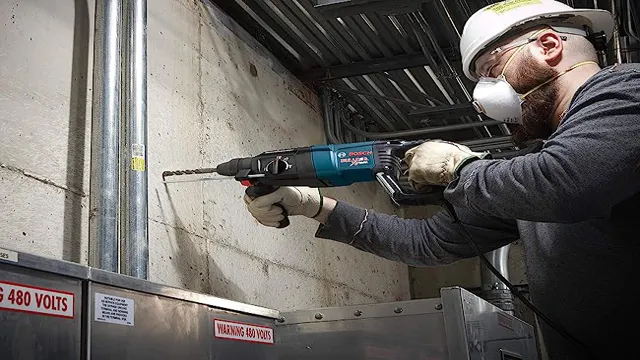
Drill Bits for Concrete
Drill bits for concrete are essential tools for any DIY project or construction work that involves drilling into concrete surfaces. However, it’s important to note that not all drill bits are created equal. There are specific types of drill bits designed to handle the unique challenges presented by concrete.
The most common type of concrete drill bits feature a tungsten carbide tip that can penetrate even the hardest concrete surfaces. These bits are built to withstand high levels of friction, and they come in a variety of shapes and sizes to suit different drilling tasks. It’s also worth noting that the size and power of your drill will play a key role in effective drilling.
A small drill bit may struggle to penetrate a thick concrete surface, while a larger drill bit may lead to excessive heat buildup and potentially damage the bit. By choosing the right type and size of drill bit for your concrete project, you can ensure a smooth and successful drilling experience.
Hammer Drill vs. Regular Drill
“Can you use a regular drill for concrete or do you have to use a hammer drill?” This is a common question asked by DIY enthusiasts and professionals alike. The answer is straightforward- a regular drill simply won’t do the job on concrete. This is because concrete is one of the toughest materials to drill through and requires a lot of power and force to penetrate.
A hammer drill, on the other hand, is specially designed to create a pounding motion that helps to break through the dense surface of concrete. With the right bit, a hammer drill will make drilling through concrete a breeze. So, if you’re planning on drilling through concrete, it’s essential to use a hammer drill.
If you attempt to use a regular drill, you’ll quickly realize it won’t work, and you’ll likely damage your drill bit and put yourself at risk.
Differences in Functionality
When it comes to drilling, there are two types of drills that you can use – a regular drill and a hammer drill. These tools may look similar, but they are different in functionality. A regular drill is great for drilling holes into wood, plastic, or metal surfaces, but it may struggle when faced with hard materials like concrete or brick.
This is where a hammer drill comes in. With its hammering motion, it can easily penetrate hard surfaces. Think of it this way – a regular drill is like a knife that can cut through soft materials, while a hammer drill is like a hammer that can break through tough surfaces.
The hammer drill functions by using a motor that drives a cam or piston that creates a hammering motion. This action provides the high amount of force necessary to drill through the toughest of surfaces. So, when deciding which drill to use, consider what kind of surface you’ll be drilling into.
If it’s a straightforward job on a wooden table or plastic board, then a regular drill is more than adequate. However, if you’re drilling on a concrete wall or brick surface, then a hammer drill is your best bet. The choice ultimately depends on your project, but make sure to choose the right tool for the task at hand.
Which Drill to Choose
Choosing the right type of drill can be a bit confusing, especially if you’re not familiar with the different types available. Regular drills and hammer drills are two of the most popular options, and knowing the difference between these two can help you make the right decision when it comes to your drilling needs. Regular drills are perfect for light-duty tasks such as drilling holes in wood or tightening screws.
They are lightweight and easy to use, making them a great option for beginners or DIY enthusiasts who are just starting to explore the world of drilling. On the other hand, hammer drills are ideal for more heavy-duty tasks such as drilling holes in concrete or masonry surfaces. These drills have a special mechanism that makes them ideal for drilling into hard surfaces, hence the name “hammer” drill.
So, which drill should you choose? It all depends on the type of project you’re working on. If you’re only planning on doing light-duty tasks, a regular drill will suffice. However, if you’re planning on working with tougher materials such as concrete or masonry, then you’ll need a hammer drill to get the job done.
In conclusion, understanding the difference between a regular drill and a hammer drill can go a long way in helping you make the right choice when it comes to your drilling needs. Whether you’re a beginner or an experienced DIY enthusiast, having the right tools for the job is essential for getting great results.
Benefits of Using a Hammer Drill for Concrete
If you’re thinking of doing some concrete work, you may be wondering if you really need to use a hammer drill. The short answer is yes, you do need to use a hammer drill if you’re working with concrete. Here’s why.
First of all, drilling into concrete can be incredibly tough on your drill bits. Hammer drills have a specialized function called “hammering” which assists in breaking up the tough concrete. Using a regular drill to try and drill into concrete can lead to a lot of frustration and wasted time.
Secondly, a hammer drill can help you get the job done faster. This is especially true if you’re drilling a lot of holes, as the hammering function can quickly break up the concrete and make it easier to drill. Lastly, a hammer drill gives you more control and precision when drilling into concrete.
Without the hammering function, your drill bit can easily slip or become stuck, making it difficult to achieve the accuracy you need. So, while it’s true that you don’t necessarily have to use a hammer drill for concrete, having one will make your life a whole lot easier and more efficient.
Efficiency
“Hammer Drill for Concrete” Using a hammer drill for concrete has a lot of benefits that make it a tool you shouldn’t overlook. One of the primary advantages of using a hammer drill for concrete is its efficiency in drilling through tough surfaces. Unlike regular drills, the hammer drill applies a pulsing pressure that aids in breaking up and chipping away at the material you’re working on, making it ideal for making holes in tough surfaces like concrete.
This feature saves a lot of time and energy, especially when you need to make several holes. Additionally, using a hammer drill for concrete reduces the likelihood of your drill overheating, which is a common problem when working with hard materials. This tool also saves you from having to use a hammer and chisel, which can be tiring and imprecise.
Overall, using a hammer drill for concrete can make your job quicker and easier, giving you more time to focus on other tasks at hand.
Accuracy
If you’re looking to drill into concrete, using a regular drill just won’t cut it. That’s where a hammer drill comes in handy! A hammer drill uses a pulsating action to break through tough materials, including concrete. The accuracy of a hammer drill is a major benefit.
With a standard drill, you risk wandering and creating an uneven hole, but a hammer drill’s powerful motion keeps it on track. This makes it easier to drill precise holes, even in tough materials like reinforced concrete. Additionally, a hammer drill can make short work of drilling multiple holes, making it a time-saving option for larger projects.
So, if you need to make holes in concrete, a hammer drill is the way to go!
Conclusion
In conclusion, the question of whether a hammer drill is necessary for concrete is akin to asking if a fork is necessary for eating soup. Sure, you could try to dig in with a spoon, but it’s going to take a lot more effort and time. Similarly, while it is technically possible to use a regular drill on concrete, the process will be slow and laborious, and you’ll likely end up with less-than-optimal results.
To make the job easier and achieve the best possible outcome, it’s highly recommended to use a hammer drill specifically designed for concrete drilling. Don’t make things harder than they need to be – grab the right tool for the job!”
FAQs
What is a hammer drill and what is it used for?
A hammer drill is a power tool that is used for drilling through tough materials such as concrete, masonry, and stone. It utilizes a percussion mechanism to generate high impact forces that enable efficient drilling.
Can I drill through concrete without a hammer drill?
While it is possible to drill through concrete without a hammer drill, it can be a time-consuming and challenging task. A hammer drill is specifically designed for drilling through concrete and makes the job much easier and faster.
What features should I look for when buying a hammer drill for concrete?
When buying a hammer drill for concrete, some important features to look for include the drill’s power rating, the type of chuck it uses, its drilling speed, and the depth stop mechanism. Additionally, it is also important to consider the grip, weight, and overall build quality of the drill.
Can a regular drill bit be used in a hammer drill for concrete?
No, regular drill bits are not designed to withstand the high impact forces generated by a hammer drill. To drill through concrete, you will need to use special masonry bits that are specifically designed for hammer drills.
What safety precautions should I take when using a hammer drill for concrete?
When using a hammer drill for concrete, it is essential to wear proper safety gear such as eye protection and hearing protection. Additionally, you should never touch the bit while it is still spinning, and you should always keep your hands away from the trigger to prevent accidental drilling.
Can a hammer drill be used for other materials besides concrete?
Yes, a hammer drill can be used for drilling through other tough materials such as masonry, stone, and metal. However, it is important to choose the right type of bit for the material you are drilling through.
How do I maintain my hammer drill for optimal performance?
To maintain your hammer drill for optimal performance, you should always follow the manufacturer’s instructions for use and maintenance. This may include periodically lubricating the drill, cleaning it after use, and sharpening or replacing the drill bits as needed.

